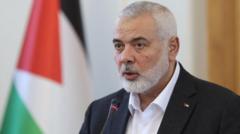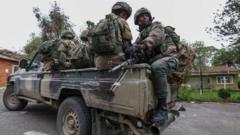Israel's defense minister reveals the killing of Hamas leader Ismail Haniyeh in July, intensifying rhetoric as the Israeli military targets the Houthis in Yemen amidst ongoing hostilities with Hamas in Gaza, where civilian casualties continue to rise.
Israel Admits to Killing Hamas Leader Haniyeh; Conflict Intensifies in Gaza

Israel Admits to Killing Hamas Leader Haniyeh; Conflict Intensifies in Gaza
In a bold declaration, Israel confirms the assassination of Hamas figure Ismail Haniyeh, as military actions escalate against Iran-backed groups like the Houthis.
In a significant acknowledgment, Israeli Defense Minister Israel Katz confirmed that Ismail Haniyeh, the political leader of Hamas, was killed in an Israeli operation in Tehran last July. Katz made the announcement while outlining plans to intensify strikes against the Iran-backed Houthi movement in Yemen, which has been launching missiles at Israeli targets. Haniyeh's assassination took place during an operation at the building where he was residing in the Iranian capital, and his death has been attributed to Israeli intelligence efforts.
Israeli Prime Minister Benjamin Netanyahu reported some advancements in negotiations for a ceasefire between Israel and Hamas, but he could not specify a timeline for its implementation. A senior Palestinian official previously conveyed to the BBC that discussions were nearing 90% completion, but key unresolved issues remained.
During his speech, Katz reiterated Israel's commitment to take decisive action against the Houthis and mentioned that the Israeli military would "decapitate" their leadership as it has done with Haniyeh, Yahya Sinwar, and Hassan Nasrallah. Haniyeh’s death led to Yahya Sinwar, chief architect of the attacks on October 7, assuming overall leadership of Hamas. Sinwar was later killed in Gaza, leaving the group looking for a new leader. Nasrallah, the Hezbollah chief backed by Iran, was assassinated in Beirut in September amid escalating violence along the Israeli-Lebanese border, with conflict surfacing daily since the October attacks.
The Houthis, controlling northern Yemen, resumed missile strikes on Israeli and international vessels shortly after the Israeli military response to Hamas attacks in Gaza, which commenced following the October conflict that resulted in around 1,200 Israeli casualties and the taking of hostages. An attempted missile interception by Israeli forces from Yemen was reportedly unsuccessful, resulting in damage to a park in Tel Aviv. In retaliation, the Israeli military executed strikes against Houthi artillery positions in Yemen, aligning with coordinated operations from the U.S. and the UK.
The humanitarian situation in Gaza has become increasingly dire. Recent reports highlight severe shortages of food and water, with only a handful of aid trucks managing to distribute supplies over the last two months. Criticism has flooded in, condemning Israel for alleged obstructions in humanitarian efforts, while the Israeli government refutes these claims, asserting extensive and ongoing aid is being provided to the region.
International rights organizations, such as Oxfam and Human Rights Watch, have raised alarms about the escalating humanitarian crisis, accusing Israel of genocidal actions against Palestinian civilians in Gaza. Nevertheless, the Israeli foreign ministry has dismissed these allegations as fabrications, reiterating its commitment to humanitarian relief efforts while justifying military operations aimed at neutralizing perceived threats from Hamas.
As the conflict rages on, both sides remain locked in a violent cycle, with the situation for civilians in Gaza deteriorating amidst ongoing military escalations and debates over leadership in Hamas and Houthi groups.






















